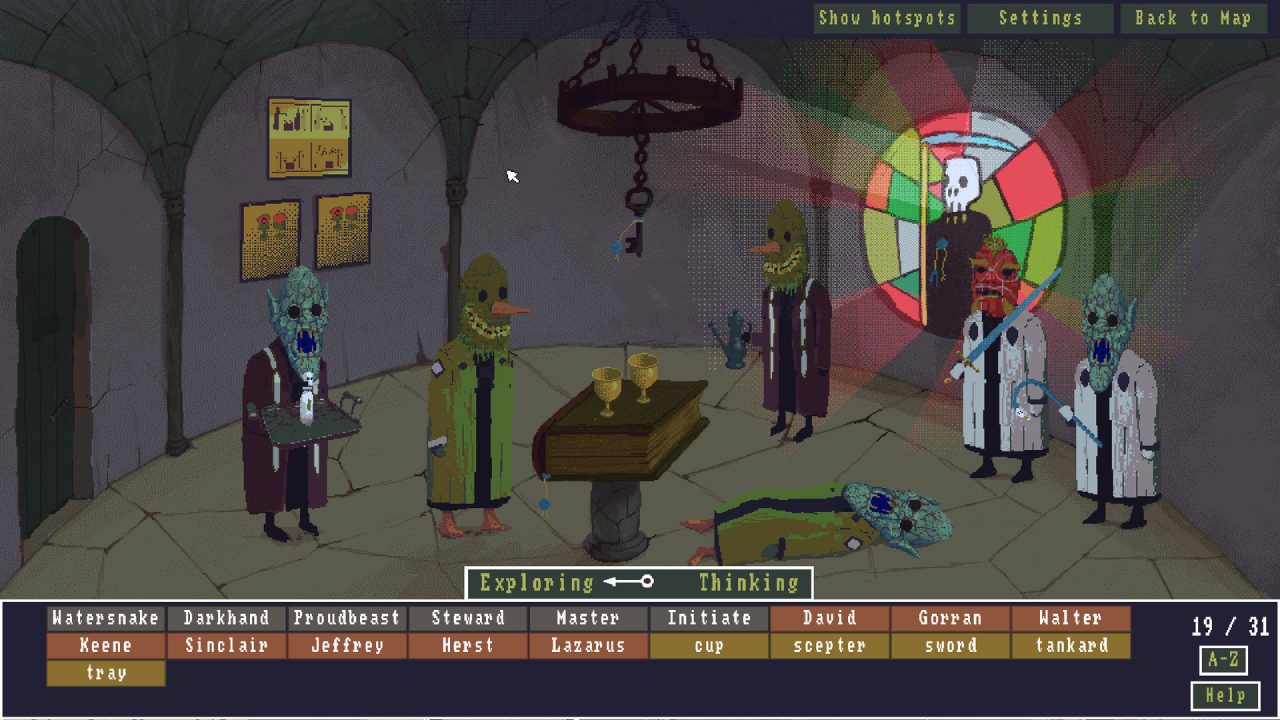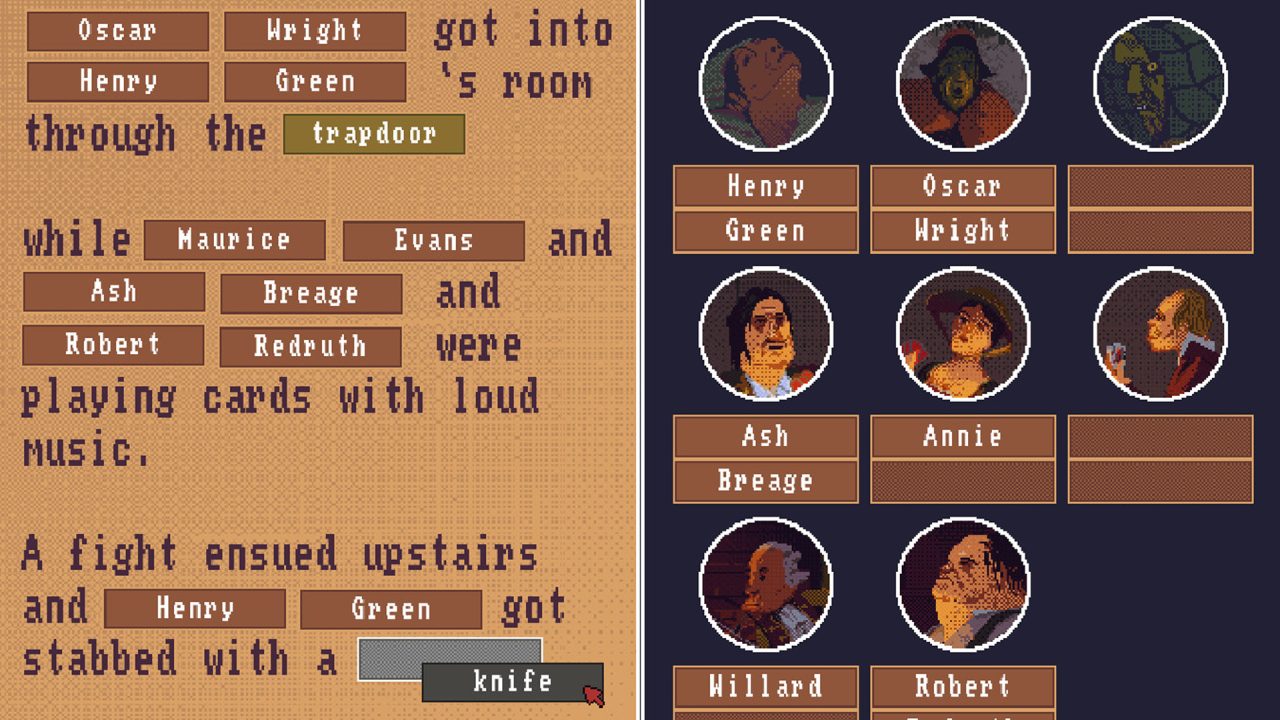The Case of the Golden Idol is a master of other developers’ craft. I don’t mean this in any derogatory way, as this detective adventure takes the best elements of its inspirations and reshapes them into a package that outclasses the originals in many ways. Just make sure to play the original PC release and not the Game Pass iteration.
The foremost influences on The Case of the Golden Idol are the works of Lucas Pope. It mashes up the fill-in-the-blank detective work of Return of the Obra Dinn and the drag-and-drop interface of Papers, Please (plus some less-than-subtle visual callbacks), alongside an art style and scene investigation mode that would feel at home in a LucasArts point-and-click adventure or an Ace Attorney game. The glue holding it all together is a story that evokes pulp fiction in tone and Pulp Fiction in structure.
The tale spun by this game revolves around the titular golden idol and its myriad mysterious properties. What these are, where they come from, and most importantly, what people will do to wield their power is slowly unveiled throughout the story. Every level depicts a key moment in which this power dynamic shifts, typically involving a grisly murder(s) by devious means. While the main story is largely linear, it will, at key moments, rewind the clock to reveal omitted events. This is particularly true of the prequel DLC which completely reframes how you perceive the base game, especially its inciting incident. There’s an innate euphoria when early events that seemed random from the outset reveal themselves later to be of great significance.

Nothing is laid out for you on a platter, though. It’s your job to inspect every scene for clues, filling out your word bank as you pore over every witness statement, document, and object. These are used to fill in blank spaces in a script documenting a scene’s preceding and current events. Much like Return of the Obra Dinn, you must accurately chronicle every event, person, and bit of miscellaneous information in a level before the game will confirm if you’re correct. The game offers a few concessions, such as separating each level’s deduction requirements into categories that are individually evaluated for correctness and an indicator when you have two or fewer mistakes in a category. These categories also build upon each other to help you figure out the bigger picture, with tasks such as naming everyone in a scene or figuring out the meaning of symbols.
In other words, you’re never left without the requisite information to deduce the story, but those support systems don’t help without doing the legwork yourself. There’s an immense satisfaction in feeling that you came to correct conclusions on your own. The Case of the Golden Idol doesn’t leave you out to dry when you’re stuck, though. Its hint system—which the developers suggest against using multiple times before giving away the goods—provides vague directions that set you down the correct path for a chosen aspect of the level’s mystery. By believing in the intelligence of their players, the developers sidestepped the common issue of hint systems simply giving away the answer while still providing useful guidance. The few times I turned to hints, I felt no less clever for being able to solve the case, only less frustrated. If I had one quibble, it’s that the randomized photo-word association game that unlocks hints gets monotonous and can be easily brute-forced (but is easy enough that you won’t need to). It’s tedious bloat that does nothing to enhance a hint system that would be no different without it, to the point where it was removed in the Game Pass version.
The interface revolves around flipping between the “explore” mode where you explore and interact with the level, and a “thinking” screen where you fill in blanks using your word bank. Pointing, clicking, and dragging with a mouse are all responsive and natural; it works quickly and seamlessly to the point where there are only unsung virtues to sing of. However, there are some quality-of-life improvements that would’ve been helpful. For example, having to constantly drag the first and last names of characters separately once you’ve identified them doubles the amount of mouse work needed, and the nodes that indicate whether you’ve already checked a clickable area are hard to distinguish. This is the one other area that the Game Pass port improved on, changing the original flashing dots to clearly denoted question marks, exclamation points, and check marks.

Visually, The Case of the Golden Idol looks like it belongs precisely in the LucasArts adventure game catalogue. If this is your cup of tea, you’ll love the intentionally crude, over-exaggerated, outright-unhinged drawings. Characters flourish with their wide-eyed, mouth-agape expressions and uncanny features. Environments are detailed without having too many distractingly extraneous elements, and scenes masterfully combine comedic playfulness with an overbearing ominousness. It’s an acquired taste for sure, but if it’s yours, you’re in for a lot of (un)pleasant surprises.
The soundtrack is a bit more complicated to evaluate. On its own, it’s a fantastic mood-setter for The Case of the Golden Idol’s occult themes. Sharp, plucky notes that would feel at home in a hypothetical Shakespeare soundtrack blast through brooding drum patterns and bass lines. The problem is that given how long you’re in a level, these tracks become grating upon repeated loops. Some levels may take you a half-hour or more to finish, which means you’re hearing the same few minutes of music repeated dozens of times. Every level has its own music, but since they’re all variations on similar discordant soundscapes, they do less to break up the repetition than I’d like. It’s an unfortunate issue as, again, this is a well-conceived soundtrack insomuch as its tone and interplay of instrumental palettes.
If you’re interested in playing The Case of the Golden Idol, I strongly recommend playing the original PC release on Steam, NOT the Game Pass version. I know I’ve spoken of positive changes the Game Pass version made multiple times, but those are the exception to mediocrity in an otherwise bad translation for controllers. This version—which I played in full for this review alongside the PC original—is riddled with bugs, most of which mess with the core control functionality of the game. Navigating scenes is a chore as you either deal with unwieldy d-pad scrolling that feels like it randomly jumps between interactable screen elements, or an extremely slow virtual mouse pointer. The text was also changed to a flavorless font that reads better on TVs but simply looks worse when playing on PC. To be clear, the Game Pass version on PC is a port of the console version and works with a mouse, but still adheres to a clunky interface. Some games just aren’t meant for controller play.

What I can wholeheartedly recommend is the DLC. While the base game tells a complete story, these prequel chapters provide context that fundamentally alters how you understand that story, while also being compelling tales in their own right. Their gameplay also iterates and improves upon the structure of base game levels, sporting more complex scenarios and puzzles. The developers clearly felt more confident with each passing expansion, and it’s left me highly anticipating how their forthcoming sequel will show continued growth.
If you’re on the fence about whether The Case of the Golden Idol is for you, I highly recommend giving its demo a shot. You may be surprised at how engrossing this off-kilter take on Mad Libs crossed with point-and-click adventuring is. It’s the perfect example of a game that takes established ideas and creates a unique identity for itself by frankensteining them together.



